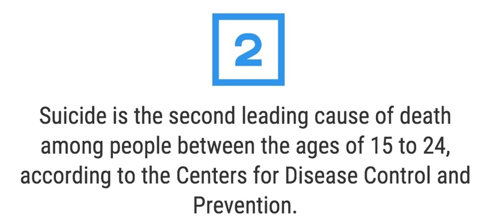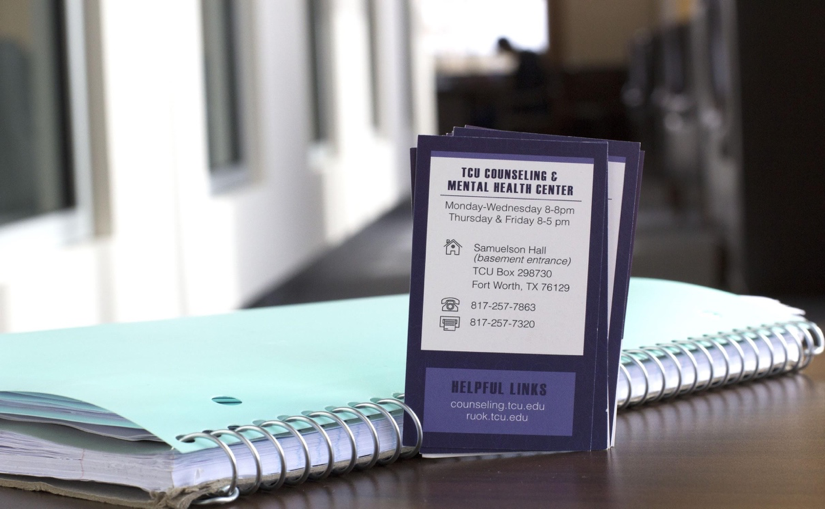In the spring semester of his first year at TCU, a student who chose to remain anonymous purposely stepped into oncoming traffic.
The student was drunk and had felt depressed for months. He hadn’t planned to hurt himself, but under the influence of alcohol, that’s what he tried to do.
His friends pulled him away from the cars before he could get hurt, but the suicide attempt showed him that he needed to get professional help for the anxiety and depression he had experienced since coming to TCU.
“There was definitely an underlying reason I took that step,” he said. “I was so depressed and I felt that I had nowhere to go.”
He experienced periods of anxiety during high school, but the issue got worse when he came to college.
“Growing up, I had a life that was pretty easy,” he said. “I never really had tough situations where my anxiety and depression [came] out.”
This student’s experience is not uncommon on college campuses, where an increased number of students need assistance with their mental health, said Yvonne Giovanis, assistant director of the TCU Wellness Center.
A survey found 95 percent of directors of college counseling centers reported a significant increase in severe psychological problems among their students.
The TCU Counseling and Mental Health Center sees 10 to 15 percent of the student body each year, said Eric Wood, assistant director of counseling and mental health.
Wood added that the increase in the number of students who are reporting mental health concerns, such as anxiety and depression, may actually be caused by an increase in the number of students seeking help- not by an increase in the overall prevalence of these concerns.
“I feel like there’s more students who are open to acknowledging that they’re struggling,” Giovanis said. “They’re seeking help.”
Although both intermittent sadness and stress are common among college students, when these feelings become pervasive and consuming, students may be facing a mental health concern, Giovanis said.
“There are always going to be challenges,” she said. “The key is being able to manage the challenges of daily living. A student who is doing well in mental health is able to cope and figure out how to balance things.”
Giovanis added that pressures such as academic demands and the financial burden of paying for college can increase mental health concerns among students.
“Knowing the cost of college puts a bit of a burden on students,” she said. “If they or their parents are putting $60,000 a year toward the end goal, this is not something they feel like they can fail at.”
The fear of failure contributed to a cycle of anxiety that impacted the academic success of Kristen Pirkey, a senior nursing major.
While taking tests, Pirkey said her anxiety would become so severe that she felt as if she “blacked out.” Even when she knew the material she was being tested over, Pirkey’s anxiety prevented her from reading and thinking through the questions.
“I really didn’t have any sort of reasoning,” she said. “I knew I was there, but I was not absorbing any of the information that I was reading.”

Pirkey’s test anxiety became so pervasive that it eventually began to impact her life outside the classroom.
“Almost every day, I would be in constant turmoil,” she said. “Whenever I woke up, I was stressed and I would be overwhelmed and worked up.”
The anxiety even impacted Pirkey’s ability to sleep, socialize and caused her to question whether or not she had chosen to the right major.
“I finally found something that I’m passionate about and I’m working my hardest to be what I want to be, and my anxiety is holding me back,” she said. “I would start questioning and asking if I’m not doing well in school; is this really my passion? Anxiety tears you down.”
After being encouraged by her adviser to seek help for her anxiety, Pirkey went to her doctor and started taking medication to alleviate the symptoms.
Since starting the medication in the spring of 2017, Pirkey said her anxiety has decreased and her grades have improved.
“On a test, even if I don’t know the answer, I actually have a thought process and can make a logical guess,” she said. “I would not have been able to do that last semester.”
More students are coming to college with some kind of mental health diagnosis, which may also account for the increased number of college students who report mental health concerns, Giovanis said.
This was the case for Savannah Rae Hale, whose depression and anxiety started in middle school.
“Ever since then, the more apparent side effects come in waves,” she said. “It results in a panic attack where I can’t think, start to hyperventilate or just need to cry until it all stops.”
According to Wood, a combination of stressors can cause increased mental health concerns for students when they first come to college.
“For first-year students, it’s the first time where pretty much everything in their life is changing,” he said. “At the same time, physically their brain is developing. On top of that, you’re going to have the college stress that is inherent with the demands of school, trying to find social connections and all of that is going to hit at the same time.”
The anonymous student said he wasn’t fully prepared to handle the challenges of college when he came to TCU because he was far from the support system of his family.
“When you come to college, you have to handle life on your own,” he said. “I think there’s a lot of pressures that you’re introduced to when you’re on your own, so it’s really difficult to cope with those things and make sense of all of those decisions that you’re trying to make.”
Rebekah Stutheit, a senior religion and communication studies double major, said she realized she had anxiety during her freshman year.
“It started because adapting to being in college was a really strenuous experience,” she said. “On top of that, I was sexually assaulted during my freshman year.”
Stutheit added that her anxiety progressively worsened and she started having recurring nightmares and panic attacks. Her panic attacks could be triggered by an upsetting event and then would “snowball into the feeling of not being able to breathe and not being able to move or do anything about it.”
Stutheit’s anxiety became so debilitating that there was a three-week period during her sophomore year when she could barely leave her bed.
“That’s when my friends pushed me to get help because they noticed that it was such a deep spiral down from where I had been,” she said.
Stutheit started going to the counseling center and said that although she still has difficult days, her anxiety has drastically improved.
“I don’t have anxiety attacks as often and I’ve learned ways to cope with it when I do,” she said. “I still have my bad days where I feel like I can’t get out of bed, but even on those days, I know how to handle where I’m at.”

Anxiety is more commonly reported by students, but depression is still a major problem that can manifest itself in many different ways, Wood said.
Across the country, more than one in three undergraduate students said they felt so depressed it was difficult to function, according to the National College Health Assessment. One out of ten have considered attempting suicide.
“For someone who’s depressed, everything feels overwhelming,” Giovanis said. “Everything feels dark and all your senses feel muted.”
While facing depression during her first year at TCU, it was a daily battle to find the motivation to go to class, study and socialize, said Briar Hill, a junior psychology major.
After class, Hill said she would go straight to bed and stay there for hours, which caused both her grades and health to suffer.
“It got to the point where I wasn’t even sleeping anymore; I was just looking at the ceiling and doing nothing,” she said.
Hill went to her doctor who prescribed an antidepressant, but the medication was not properly monitored.
“Over time, I realized I still wasn’t happy, so I tried to find other things to make me happy, but nothing really helped,” she said. “It got to a point where I realized my life wasn’t worth living, so I tried to commit suicide.”
“It just got the point where I felt like it would be better off if I just didn’t try anymore,” she added.
For Hill, suicide felt like an escape.
Wood said that the desire to escape overpowering feelings or pain is often the main reason college students attempt suicide.
“They feel so overwhelmed with a lot of pressures and don’t know a way out,” he said. “At that age, they don’t really want to die; they’re just saying, ‘I want to get rid of the pain and cope.’”

Hill’s ex-boyfriend stopped the suicide attempt and called her parents. Hill spent three days in the hospital and her medication was regulated. She eventually decided to take a year off from school to continue to regain control and spend time with her mom who had been diagnosed with colorectal cancer.
Hill said she tried to hide her anxiety and depression from her friends and family because she feared she would be stereotyped and stigmatized.
“I wanted people to think I was okay,” she said. “I’m typically a very optimistic person, so being in those situations where I felt worthless was not something I had experienced before I came to college. It was hard to ask for help.”
Even though the stigma surrounding mental health has improved over the years, there is still work to be done to educate the people about the true nature of mental health, Giovanis said.
“Nowadays, words like depressed, panic attack and anxiety still make people raise their eyebrows,” Hale said.
“Many think that people with mental health concerns are ‘crazy’ or that ‘something is wrong with them,’” Hill said.
These labels are hard to overcome, said Jasmine Thompson, a senior criminal justice major who dealt with depression throughout high school and college.
“Labels make people feel small and make people feel like they are stuck with the condition,” she said. “If you call someone depressed, they may feel they will be depressed forever. If you say someone has depression, they may feel that it’s treatable.”
Mental health concerns, such as anxiety and depression, are considered medical conditions that can be treated with the proper medical care, Wood said.
“A mental health concern is no different than a heart condition — it’s a health problem,” said Jamie Dulle, an assistant dean of Campus Life. “Just because we can’t see the hidden injury doesn’t mean that it’s not there.”
When experiencing mental health concerns there are “actual changes in the brain structure and hormones,” Giovanis said.
She added that bipolar disorder and schizophrenia are mental health concerns that are less commonly talked about.
“Those are the two where the onset is actually highly likely in this age group if someone is going to start exhibiting symptoms,” Giovanis said. “They tend to be more impactful and a lot of the times, the medication treatments are not as straightforward.”
She also said that because bipolar disorder and schizophrenia are less common among students, they are more often stigmatized and misunderstood.
Educating people about mental health is an important step in de-stigmatizing the topic, said Thompson.
After receiving treatment for his depression and anxiety, the anonymous student wanted to use his experiences to educate and help others who may be facing mental health concerns. He became an orientation leader and shared his story with incoming first-year students.
“I wanted them to realize how important it is to focus on your mental health,” he said. “It’s nothing to be ashamed of, so I’m willing to talk about it.”








